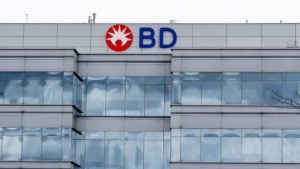Health care companies often prove to be recession resilient, as their medicines and medical devices usually remain in high demand even if the economic environment weakens. Consumers need these products to maintain or improve their quality of life, regardless of state of the economy. At the same time, the world’s population continues to age, which should provide an opportunity for growth and solid dividends among the different types of companies within the health care sector.
This allows for companies in this sector to have rather consistent growth over all portions of the economic cycle, paving the way for investor to reap the reward of regular dividends.
For these reasons, income investors have the availability of a wide number of health care stocks that can provide market-beating dividends. This article will examine three of our top health care stocks today, all of which have a yield close to or higher than the average yield of the S&P 500 index.
The health care sector is usually one of the more recession resistant sectors of the economy as consumers will seek out medical care even in adverse economic conditions. All three stocks have built up long histories of dividend increases and should be able to continue increasing their dividends each year.
Becton, Dickinson & Co. (BDX)

Becton, Dickinson & Co., or BD, is a global leader in the medical supply industry. The company has been in business since 1897 and sells its products in more than 190 countries.
BD’s portfolio includes needles for drug delivery and surgical blades as well as products used for infusion systems, urology and the collection and transportation of diagnostic specimens. The company is a leader in nearly every area of the medical device industry that it participates in. BD has annual revenues of approximately $19 billion, with nearly half coming from international markets.
Following a 5.1% increase late last year, BD has a very impressive 49 consecutive years of dividend growth. This qualifies BD as a dividend aristocrat, an exclusive group of companies that have at least 25 consecutive years of growing dividends.
The latest increase is much higher than the previous three raises that BD has given to shareholders as the company digested its $24 billion purchase of C.R. Bard in 2017. The dividend has increased with a compound annual growth rate of 7% over the last decade.
With an annualized dividend of $3.32, BD trades with a dividend yield of 1.3% today. This is just below the average yield of 1.5% of the S&P 500 index. With a dividend growth streak approaching five decades, BD has shown an ability to manage its dividend more successfully than most other companies.
With expected earnings per share of $12.80 for the current fiscal year, BD has an expected payout ratio of just 26%. This is below the 10-year average payout ratio of 31%.
Following several lean years of low single-digit dividend increases, BD delivered a higher raise of 5.1% in 2020. Prior to 2017, dividend growth was often in the low double digits. We believe that the size of the dividend increase going forward will likely begin to resemble these prior growth rates due to the company’s leadership in its industry and the lower-than-average payout ratio.
Bristol-Myers Squibb (BMY)

Bristol-Myers Squibb is a leading pharmaceutical company that specializes in cardiovascular and ant-cancer medicines. The current edition of the company has been in existence since 1989, when Bristol-Myers and Squibb completed their merger.
More recently, the company completed its $74 billion acquisition of Celgene in late 2019. Bristol-Myers’ top grossing products include Eliquis, used to prevent blood clots, Revlimid, used to treat myeloma and other cancers, and Opdivo, used to treat cancers such as renal carcinoma. The company generates almost $43 billion in annual revenues.
For many years, investors received raise of a penny per share from Bristol-Myers. That has recently begun to change as the company has raised its dividend by a high single-digit percentage the last two years, most recently providing an 8.9% increase for the payment made at the beginning of February.
The latest raise marks the 12th consecutive year of dividend growth for BMY stock. Given the demand for the company’s product portfolio and the addition of Celgene, we believe it is likely that investors can expect to see dividend growth rates comfortably above the decade-long compound annual growth rate of 3.1%.
Bristol-Myers new annualized dividend of $1.96 results in a current yield of 3.2%, which is more than double that of the average yield of the market index. The company expects to earn $7.45 in 2021, which equates to a projected payout ratio of just 26% and is below the five-year average payout ratio of 43%. This should provide the company plenty of cushion to continue to grow its dividends at a higher than usual pace.
Like BD, Bristol-Myers has started to offer dividend growth at a rate that investors are not accustomed to. This is a positive as it should be taken as a sign that the company’s management expects business results to improve at a much better clip going forward. Bristol-Myers’ appeal of a high-quality business, healthy and safe yield to go along with what could be better dividend growth should make the stock appealing to income investors.
Medtronic plc (MDT)

Medtronic PLC manufacturers more biomedical devices and implantable technologies than any other company in the world. The company provides products in more than 150 countries.
Medtronic consists of four business segments, including Cardiac and Vascular Group, Minimally Invasive Therapies Group, Diabetes Group and Restorative Therapies Group. The company has annual revenue of nearly $29 billion.
Shareholders of Medtronic received a 7.4% dividend increase for the distribution made in mid-April of 2020, which is just below the company’s 10-year compound annual growth rate of 9.1%. Medtronic dividend growth streak has now extended to 43 consecutive years.
Medtronic currently distributes an annualized dividend of $2.32. Shares yield 2%, which provides a higher level of income than the market does presently. We expect the company to produce earnings-per-share of $4.25 in fiscal year 2021, the payout ratio is projected to be 55%. This is higher than the average payout ratio of 34%, but not to a level where we are concerned about Medtronic’s ability to increase dividends in future years.
Medtronic’s leadership position in the medical device sector should allow it to capitalize on aging populations. This in turn should provide the company with the ability to not only maintain but grow its dividend payments to shareholders as it has for more than four decades. We believe that future dividend growth is hardly in doubt even with the payout ratio above its usual range.
On the date of publication, Bob Ciura was long BMY. He did not have (either directly or indirectly) any other positions in the securities mentioned in this article.
Bob Ciura has worked at Sure Dividend since 2016. He oversees all content for Sure Dividend and its partner sites. Prior to joining Sure Dividend, Bob was an independent equity analyst. His articles have been published on major financial websites such as The Motley Fool, Seeking Alpha, Business Insider and more. Bob received a bachelor’s degree in Finance from DePaul University and an MBA with a concentration in investments from the University of Notre Dame.
